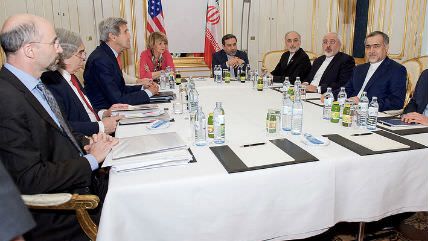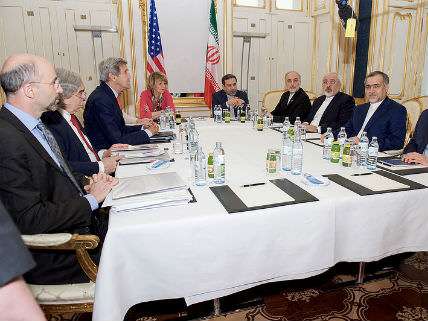5 Things to Know About Congress Taking On the Iran Nuclear Deal
There are two weeks left for Congress to act if it wants to try to stop the deal.


Congress has just a little over two weeks to vote to approve or disapprove the deal struck between Iran and the P5+1, the U.S., U.K., China, Russia, France, and Germany, over Iran's nuclear activities. The deal was a result of years of negotiations, hinged on coordinated international sanctions. The U.N. Security Council has already approved it, but supporters of the deal view the Congressional vote as the most important hurdle. If Congress votes to disapprove the bill, President Obama will have 12 days to veto the Congressional action, and then Congress will have 10 days to try to override that video. As time runs out, here are some aspects of the process to keep in mind:
Congress is going through a progress Congress came up with.
Congress passed the Iran Nuclear Review Act, sponsored by Sens. Bob Corker (R-Tenn.) and Bob Menendez (D-NJ), in May, and despite initial veto threats, the president signed the bill into law. The legislation set up a process for the Congress to weigh in on the Iran deal. While some opponents of negotiations with Iran insisted any agreement would be a treaty, the White House considered it an executive agreement. Such agreements have become more common in recent decades—they don't require Senate approval, but can be reversed by a future president. Many of the Republican presidential candidates have promised to do just that if elected.
The mechanism Congress chose to express its opinion on the Iran deal is a typical one—Congress will be able to express approval or disapproval of the bill. If it disapproves, the president will be able to veto, requiring a supermajority in Congress to override. And if the Congress does nothing by September 17, the deal will be considered approved. Congress carved out a similar opportunity to vote to disapprove of raising the debt ceiling when it agreed to raise the debt ceiling in August 2011. Nothing came of a resolution of disapproval, and the debt ceiling was already lifted before hat vote. Likewise, when many members of Congress insisted they opposed President Obama's decision to enter the military into a United Nations-backed intervention in Libya's civil war, they were able to pass a weak resolution to "disapprove" of the intervention, but not a law that would defund or otherwise order the end of the intervention.
It's OK that the United Nations approved the deal first.
Within a week of the deal being struck between Iran, the U.S., and five other countries, the United Nations Security Council approved the deal unanimously. The five permanent members of the Security Council, the U.S., the U.K, China, Russia, and France, who all hold veto power in the body, were all part of the negotiations with Iran. While many congressional critics lambasted the Obama administration for taking the deal to the U.N. first, it wasn't the U.S.'s call to make on its own. The deal reached with Iran specified it would be sent to the U.N. first. That's not a big deal. The Security Council's approval, which relates to those parts of the nuclear deal that cover previous U.N. resolutions and U.N.-backed sanctions, doesn't effect sanctions legislation previously passed by Congress nor does it obligate Congress to approve the deal. The demand by Congressional critics that the U.N. wait was unrealistic. In the Iran Nuclear Review Act, Congress gave itself 30 days to review the deal. But if it came less than 30 days before their scheduled August recess, they would get 60 days to review, because members of Congress, apparently, didn't want to sacrifice their summer breaks to consider the deal.Not much of a sign they considered the issue pressing, and not much of a reason to ask others to delay action too.
Congress isn't voting on the side deals but they'll affect the vote.
Iran and the International Atomic Energy Administration (IAEA), the global agency tasked with monitoring nuclear activities around the world, entered into a number (at least two) of side deals during the broader negotiations. One of those deals reportedly gave Iran more leeway than usual over inspections related to the country's alleged past nuclear activities. Congressional critics of the Iran nuclear deal condemned that side deal, saying it was based on trust, not verification, the opposite of what the Obama administration had promised. Sen. Lindsey Graham (R-SC) suggested he would introduce legislation to defund the IAEA. That's the best Congress can do. The side deals were made between Iran and the IAEA, not the U.S., so they aren't part of what Congress is voting on. Withdrawing U.S. funding for the IAEA isn't necessarily a bad thing, as long as it's a sign of disengagement from internationalist meddling rather than a move toward the U.S. trying to take unilateral responsibility in preventing nuclear proliferation.
Plenty of Democrats oppose the Iran deal.
Much of the focus by supporters of the Iran deal has been on the deal's Republican critics in Congress, but the reality is some Democrats oppose the Iran deal too. Sen. Bob Menendez (N.J.) has long been a critic of the Obama administration's diplomatic efforts with Iran, having previously tried to impose new sanctions on Iran while negotiations were still taking place. Sen. Chuck Schumer (N.Y.), the presumptive next Senate Minority Leader, also recently came out against the deal. Were opposition limited to Republicans, a veto override wouldn't be a real threat. Instead, hawkish posturing by Democrats makes it a distinct possibility.
It's nothing new—despite attempts at partisan revisionism, much of the U.S.'s post-9/11 war on terror and broader foreign policy regime has been supported by Democrats as well as Republicans. The frontrunner for the Democratic nomination for president in 2016, Hillary Clinton, voted for the war in Iraq and was a big advocate of the U.S. participating in the Western intervention in Libya, an intervention that induced regime change and also left a power vacuum which various radical Islamist terrorist groups have exploited.
Even if Congress overrides the president's veto, the deal could move forward.
If the Congress votes by September 17 to disapprove of the deal and is able to overcome the president's veto, it won't sink the deal, just those portions of it which rely on Congressional action. Sanctions imposed by others will continue to be lifted. Iran's economy will continue to open up to foreign business, just not for American entrepreneurs and companies hamstrung by U.S. policy. The IAEA will move forward with the inspections regime set out in the Iran nuclear deal and the side deals. The U.S. will still likely vote in December to approve of the report the IAEA is supposed to submit regarding Iran's past alleged nuclear weapons research. Republicans may be able to defund the IAEA, but it won't affect the IAEA's program for Iran. Rejecting the deal, withdrawing from the IAEA even, would just be rejections of multilateralism. Unfortunate, but if not coupled with an effective push for unilateral American action certainly not dangerous to anyone but the U.S. itself.


Show Comments (96)